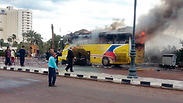
Sinai attack's target: Israeli, Egyptian tourism
Egypt and Israel are the common enemy of the radical Salafist-jihadist group Ansar Beit al-Maqdis, likely responsible for Sunday's attack which left four dead. The group's weapon of choice? Scaring off tourists
The Salafist-jihadist group Ansar Beit al-Maqdis, which is probably responsible for the terror attack on the tourist bus in the Taba border crossing between Israel and Egypt Sunday, have two sworn enemies: The current Egyptian regime, which is being led by Abdel Fateh al-Sisi, and of course Israel.
Both its enemies have an open account with the group that keeps on growing. The Egyptian army, specifically Egypt's Third Army, has been conducting an all-out war against the terror group in northern and central Sinai. Israel, on the other hand, is primarily the ideological and religious enemy which the al-Qaeda affiliated group is sworn to fight.
Related stories:
Four killed in tourist bus explosion on Sinai border
South Korean church in mourning after Sinai bombing
Ansar Beit al-Maqdis numbers around 200 operatives. The organization which was born after the ouster of former Egyptian president Hosni Mubarak a little more than two year ago, expanded its terror activities from the Sinai Peninsula and into Egypt proper after the July ouster of the Muslim Brotherhood regime, with which the group had allied. Hence, the group has recently launched a number of terror attacks against senior officials in the new Egyptian regime and against the Egyptian forces within Egypt, but without neglecting its activities in Sinai.
The attacks against Israel usually come in the wake of an IDF attack on Gaza terrorists with which the organization has ties. Even without the targeting of its operatives, the group works to harm tourism on both sides of the border – both in Egypt's Sinai and Israel's Eilat. The group's operatives know that tourism supplies the current regime with foreign currency, and that as an income it is one of the sole revenue sources that can support Egypt and bankroll its citizens.
In much the same manner, the group knows that Eilat and its residents make a living off of tourism. Therefore, any threat on the southern Israeli resort town, even a rocket which fails to hit any significant target, creates a hostile environment detrimental to tourism.
The targeting of a tourist bus whose final destination is Eilat – as was the case in Sunday's attack – is a classic case of the type of international jihad terror attacks being preached by al-Qaeda.
The bombing of the bus was probably undertaken with an explosive device hidden within a bag which was taken onto the bus and then immediately detonated. The blast took place in the front of the bus, near the driver's seat, and thus it is possible that one of the Taba crossing workers – or someone posing as one – threw the explosive bag onto the bus, fled the scene and then detonated it with a remote control.
Another possibility is that the attack was undertaken by a suicide bomber. We will know the truth soon enough. But it makes little difference. Whether it was a suicide attack or a remotely detonated bomb, the intent is clear: To hit the Egyptian and Israeli economies where it hurts and to cause pain to both the enemies of the international jihad.
The tourists traveling on the bus were South Korean Christians, and that is another reason they were possibly targeted, but in such a case it is more than possible the attack will boomerang back on Ansar Beit al-Maqdis. The majority of the group's activities are in northern Sinai and the mountainous range running along the center of the peninsula.
Ansar Beit al-Maqdis enjoys support among a number of the local Bedouin tribesmen in that religion, however, the tribes in the southern part of Sinai make their living off tourism, and object to the organization's activities to such an extent that they have even begun cooperating with the Egyptian authorities to aid them in their attempt to fight the terror group.
As a result, the number of operations conducted by Ansar Beit al-Maqdis in southern Sinai is relatively low. Sunday's attack was a direct assault on the livelihood of the southern Bedouin tribes of Sinai, and their retribution might be very costly for Ansar Beit al-Maqdis.
Nonetheless, the assumption is that over the time, the attacks against Egyptian forces and Israel will continue and even increase.










